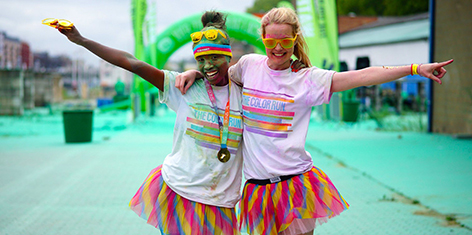
Two in millions: 2015 Color Runners doused and dressed in colours of the rainbow.
Photo: The Color Run photographer
Unleash your inner sparkle at The Color Run’s Varsity Tour. The University of the Free State is a proud host of the 2016 Bloemfontein edition. Be counted among the 5 million Color Runners worldwide who walk, skip, shimmy, or hop for five kilometres in the name of fun and charity.
The Color Run is the largest series of events in the world promoting healthiness and happiness. Arina Engelbrecht, Chief Officer at the Health and Wellness Centre, believes that “active people are happy people.” Consequently, she encourages students, staff members, and the community to join in the festivities.
Run to make a difference
Wearing white and being doused from head to toe in the colours of the rainbow while exercising is a very different way of extending a helping hand to those in need. For every ticket sold, R10 will be donated to the No Student Hungry campaign by The Color Run and Capitec Bank.
After running through four colour stations, a spectacular show awaits you at the finish line. The Finish Festival is a combination of colour throws, rainbows, glitter, music, and dancing.
The Color Run takes place on:
Date: 27 February 2016
Time: 16:00
Place: Cricket Grounds, Bloemfontein Campus.
Tickets are available online: www.thecolorrun.co.za at R250 for the public, R190 for students, including a goodie bag, or R90 without a goodie bag. Children under 10 years of age enter free. You will receive a R200 coupon to spend on The Color Run goodies or any product of your choice. Goodie bags may be collected at the Cricket Grounds from 25 February 2016.
For more information, contact hello@thecolorrun.co.za.